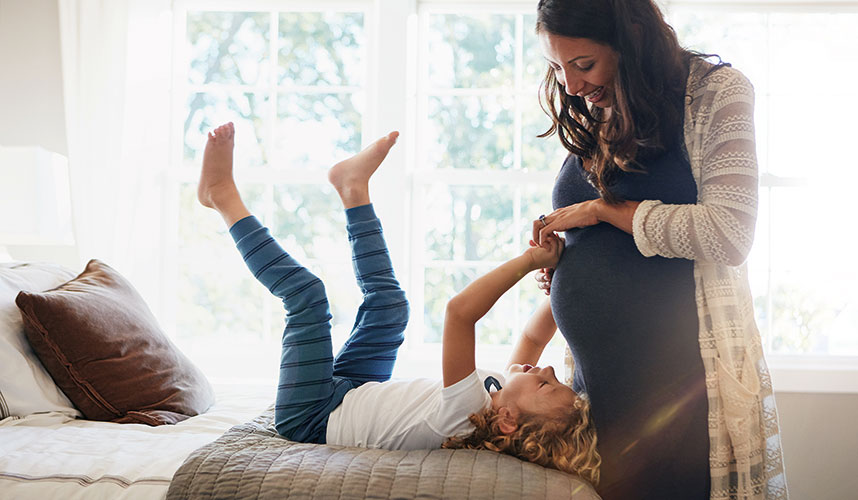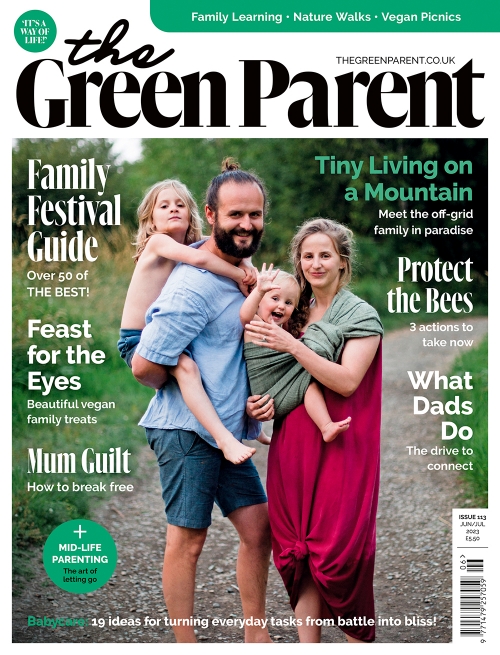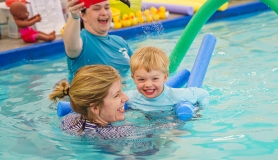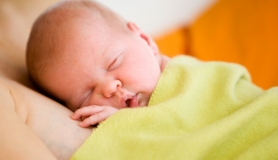You’ve been pregnant before, but that doesn’t mean that your second pregnancy will be the same. For some, their pregnancies are very similar; for others they are like chalk and cheese. No matter how similar your pregnancies are, however, the one thing you haven’t done before is to be pregnant with another child to look after. Here, we’ll look at what to expect: your emotions, the physical differences of a second pregnancy, variations in antenatal care, and how to cope with sickness, reduced mobility and exhaustion when you can’t sneak off for a nap, as you might have done in your first pregnancy.
What might be different second time around?
Second pregnancies tend to be different to first ones in many ways and, of course, all pregnancies are different in any case. It’s therefore hard to provide a definitive list of what may be different this time around, but here are some of the most common points.
Less focus on birth and more on afterwards - When you’re pregnant for the first time it’s hard to really think about life after the birth. When I taught antenatal classes, it was always difficult to get first-time parents- to-be to think about life with a newborn; they were so focused on giving birth that they didn’t have any headspace to devote to new parenthood. The second time around, this is often flipped on its head, with second- time parents being more focused on life once the new baby arrives and preparing their firstborn for the arrival of a sibling.
Fewer new friends - You’re less likely to make new friends who are at the same stage of pregnancy as you. The first time around, you may well have gone to antenatal classes, or meet-ups afterwards with parents of similar-aged babies. This time, you will probably keep the parent friends that you already have.
More tiredness - Combine the lack of opportunity to rest, the physical demands of looking after a busy young child, the sleepless nights that often accompany the tiring days and the exhaustion that new pregnancy brings and it’s likely you will feel more tired this time.
Sensitive breasts - Breast sensitivity is common in pregnancy, particularly in the first trimester as your body adjusts to the hormonal changes. If you are still breastfeeding your firstborn, however, you may find that they become significantly more sensitive. Some mums find that they need to restrict or limit feeds until this sensation passes, others feel that they need to stop breastfeeding, though many continue.
Bump size - Most mums ‘show’ quicker with their second pregnancy and their bump will probably be bigger. Research has shown that second babies are, on average, 138g bigger than first babies.
Diastasis recti - After the birth of your first baby, your abdominal muscles may not have returned to normal, leaving a gap between the two sides of the rectus abdominis muscle. Known as diastasis recti, this separation causes weakened abdominal muscles and can lead to back pain. If you suspect this is an issue for you, then either a personal trainer qualified in working with pregnant mums or a physiotherapist can help with specific exercises.
“Most mums ‘show’ quicker with their second pregnancy and their bump will probably be bigger. Research has shown that second babies are, on average, 138g bigger than first babies”
Weaker pelvic floor - Your first pregnancy and birth are likely to have impacted on your pelvic-floor strength and you may find that it is weaker during your second pregnancy, leading to a degree of bladder incontinence. If you don’t feel that pelvic-floor exercises are working for you, speak to your midwife or GP about alternative options.
Braxton Hicks - Although you would have experienced Braxton Hicks (or ‘practice’) contractions with your first baby, you may well find that you notice them more and experience them more strongly in your second pregnancy. They are also likely to start earlier than they did the first time around.
Shorter pregnancy - Research has shown that second pregnancies are an average of five days shorter than first ones.
Less help - When you’re pregnant with your second child, people are often not as forthcoming with help as they were the first time. They seem to think that because you’re an ‘old hand’ at this now, you don’t need help. Ironically, however, your second pregnancy is probably when you need the most help. While the lack of fuss and constant questioning may be welcome, it can also leave you feeling a little overlooked and uncared for. >
Coping with physical symptoms
Morning sickness and tiredness, when you’re pregnant with your first child often come as a nasty shock, especially in the first trimester. Many first-time mums-to-be have to cope with early pregnancy and work at a stage when most keep their pregnancies secret. The biggest plus about pregnancy as a first- timer, however, is being able to fully relax when you are home. I had awful nausea and pelvic pain in my first pregnancy and while the days at work were hard, I used to come home in the evening and relax. At weekends I would have long lie-ins, lazy days and many naps.
Second time around, however, I was awake by six o’clock every morning, inevitably had a toddler clinging to my legs every time I visited the bathroom when the nausea turned into vomiting and, despite the fact that my son still napped every day, my house was such a devastation zone that I felt I had to spend his naptimes cooking, cleaning and trying to get on top of an ever-growing laundry pile. If I ever did manage to nap, my son would wake and cry for me just as I had dozed off. Although I didn’t return to work after my maternity leave ended, I was well and truly exhausted, and I remember often wondering why I thought it was hard the first time around.
Finding and accepting help is key to surviving pregnancy when you already have a young child. If you have family within a reasonable distance who haven’t come forward yet, then you should approach them. Tell them that you would really appreciate them taking care of your firstborn for a couple of hours, so you can rest. And if this goes well, ask if it’s something they could consider doing regularly.
Sarah is the mother of four children. She specialises in gentle parenting methods and is trained as antenatal teacher and doula. She is the author of nine parenting books
MORE INSPIRATION
READ The Second Baby Book: How to Cope with Pregnancy Number Two and Create a Happy Home for your Firstborn and New Arrival by Sarah Ockwell-Smith (£14.99 Piatkus)
VISIT gentleparenting.co.uk for more of Sarah’s work
CARVE OUT TIME SECOND TIME AROUND
As my pregnancy progressed, I realised that I had to take control and schedule in some rest time. I came up with ways to entertain my son that didn’t involve much movement or effort from me, on the days when my husband was at work. These included:
- Water painting (a paintbrush and bowl of water) on the patio, while I lay on a sunbed alongside (he could do this for hours)
- Drawing on my legs with lip- and eyeliner, while I lay down on the bed or sofa
- Rice sensory play – a large plastic container of uncooked rice (sometimes dyed with food colouring) with different plastic animals, metal cars and sand toys to play with
- Water play in a warm bath together with lots of bubbles and bath toys; in the warmer weather we did the same in a big paddling pool in the garden
- Watching TV – I’m not a great fan of screen time, but I’m more of a believer in ‘do the least harm’, and sometimes TV was the only thing that got us through the day; on days when I felt really bad, we spent many hours cuddling and watching TV together.







